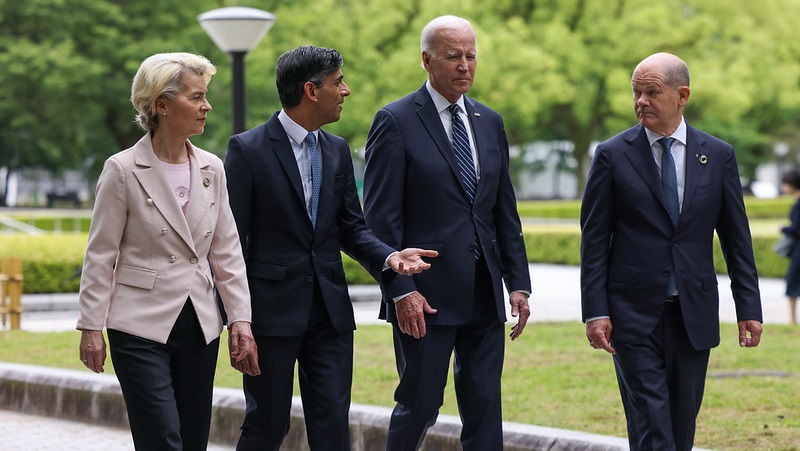The leaders of the G7 group of big, wealthy nations called this weekend for all governments to aim for net zero by 2050 at the latest.
At a summit in the Japanese city of Hiroshima, leaders approved a document calling “on all parties – especially major economies” to “commit to net zero by 2050” at the latest.
Campaigners have accused them of going against the principle that historical polluters should act faster than developing countries, which have contributed less to the climate crisis.
G7 leaders also urged countries to set targets that are aligned with limiting global warming to 1.5C.
But, according to Climate Action Tracker, none of the G7 countries have targets or policies which are aligned with the 1.5C goal.
Climate Action Tracker lists countries whose plans are compatible with 1.5 in green, “almost sufficient” in yellow, “insufficient” in orange and “highly insufficient” in red
Samoan diplomat and chair of the small islands negotiating group (Aosis) Fatumanava-o-Upolu III Pa’olelei Luteru told Climate Home that the G7 contributed disproportionately to the climate crisis and have “a responsibility to lead the way to net zero”.
“This includes assisting the global south with the financial space and support necessary to make the transition,” he added.
Rich nations have failed to provide the $100 billion a year by 2020 they promised developing countries to help them adapt to climate change and reduce their emissions. G7 countries said they would work together “to fully meet the goal in 2023”.
Climate apartheid
Avantika Goswami, from Indian think tank the Centre for Science and Environment accused the G7 of “climate apartheid”, over their 2050 net zero demands.
Rich nations “understanding” of South African delay to coal plant closures
She said that asking for the same latest net zero date for rich and poor countries goes against the principle that the big, wealthy historic polluters should reduce emissions first and fastest. This is widely accepted in UN climate talks.
She said the G7’s “recurring amnesia” on this principle was “an ongoing trick to deflect attention from their own fossil-heavy economies”. She singled out the US’s oil and gas production and Japan’s coal reliance.
Greenpeace East Asia analyst Li Shuo said the call “reflects where we are with global climate politics, namely a lot of self under-delivery while the expectation on others keeps on growing. The geopolitics these days, highlighting tensions at the expanse of solidarity, risks making the dynamic worse.”
Guterres ignored
The G7’s call adapts a similar proposal from the head of the United Nations António Guterres in March.
He called for developing country members of the G20, like China and India, to reach net zero by 2050. Currently, China targets 2060 while India aims for 2070.
But he also called on the wealthy members of the G20 – which includes all the G7 – to reach net zero “as close as possible to 2040”.
All have so far ignored his call. Germany still has a 2045 net zero date while the US, Canada, Italy, France, the UK and Japan all have a 2050 target.
Walking the talk
In Hiroshima, G7 leaders said all governments should make sure their official climate targets and strategies are "aligned with a 1.5" pathway.
If necessary, they said they should update their official UN 2030 climate plans "as soon as possible and well before [the Cop28 climate talks in November".
All governments signed off on a similar call to update climate plans at the Cop26 climate talks in 2021 - but this was then widely ignored.
Study: Fossil fuel firms owe $209bn a year for climate damage
According to Climate Action Tracker though, none of the G7 have climate plans which are compatible with 1.5C.
They give Canada's plans the worst ranking in the G7 of "highly insufficient", compatible with 3-4C of global warming.
The USA, Japan and the European Union's "insufficient" plans are considered equivalent to 2-3C of global warming while the United Kingdom's "almost sufficient" plans would put the world on course for 1.5-2C.
Gas and coal divisions
The summit revealed G7 divisions on gas and coal. At Germany's urging, the communique offered an endorsement of public investment in gas, a fossil fuel. This endorsement was heavily caveated at the urging of other G7 members.
The leaders failed to set an end date for the use of coal to produce electricity, despite Canada and the UK's climate ministries pushing for a deadline.
UAE appoints fossil fuels execs and climate campaigners as Cop28 advisers
After push-back from the US, EU and Japan, the G7 just agreed to the "phase-out" of "domestic unabated coal power generation" and to "achieving a fully or preominately decarbonized power sector by 2035".
Hosts Japan pushed for an endorsement of their strategy of using low or zero carbon fuels like ammonia and hydrogen to reduce the emissions of coal-fired power stations while keeping the stations running.
But, after resistance from other members, the communique just "note[d]" that "some countries" are "exploring" this and implied that ammonia and hydrogen are better used in sectors like industry and transportation than in producing electricity.
